Interpreting the Operating Principles and Design Methods of the Popular Wi-Fi Antenna




Recently, a Wi-Fi antenna from Russia went viral in the antenna community. Known for its rugged industrial design and acclaimed for its simplicity in construction and superior antenna performance, it has garnered widespread popularity among enthusiasts. Let's first appreciate this ingenious device.
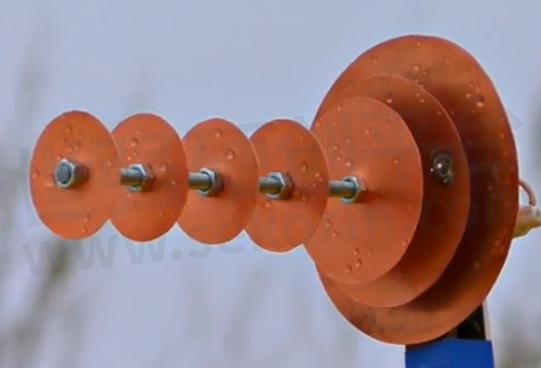
Internet-famous Wi-Fi antenna
The Working Principle of the Legendary Wi-Fi Antenna
Antenna Prototype
In this section, we delve into the operational principles of Russia's famed Wi-Fi antenna, uncovering the secrets behind its capability to receive signals from distances up to 3km. Let's begin our analysis.
Fundamentally, the Russian viral Wi-Fi antenna is an Yagi-Uda antenna. What is a Yagi-Uda antenna, you ask? Refer to the diagram below:
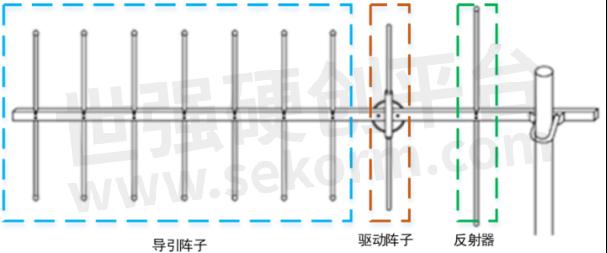
The Yagi-Uda antenna is a type of directional antenna developed in the 1920s by Japanese engineers Hidetsugu Yagi and Shintaro Uda at Tohoku University. It is renowned for its focused emission pattern and high gain, making it suitable for long-distance communications.
The antenna consists primarily of three types of elements: the director elements, driven element, and reflector. All of these elements are mounted on a central metal rod, which serves as the transmission line, as depicted in the diagram below.
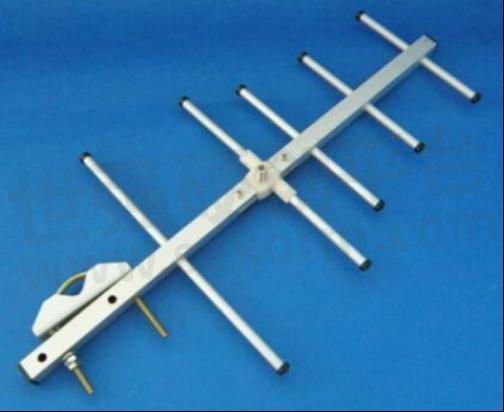
Physical diagram
It belongs to directional antennas, where each driven element and reflector consists of a pair of elements, resembling a dipole antenna. The length of the reflector elements is slightly longer than that of the driven elements. The typical radiation pattern of such antennas is illustrated below:
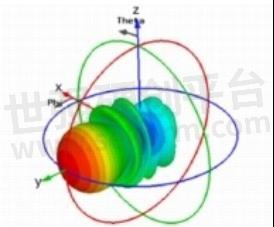
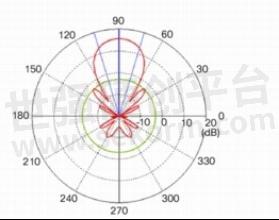
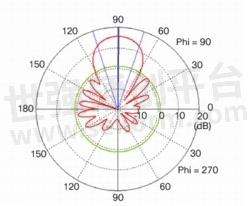
Radiation characteristics of Yagi antenna
The directionality of a Yagi antenna can be enhanced by increasing the number of director elements.
The calculation formulas for the lengths of each element in a Yagi antenna are as follows:
(1) Reflector length: L1 = 150/f
(2) Driven element length: L2 = 143/f
(3) Director element 1 length: L3 = 138/f
(4) Director element 2 length: L4 = 134/f
(5) Director element 3 length: L5 = 130/f
(6) Coaxial feed line length:
From these formulas, the following conclusions can be drawn:
(1) The director elements of the antenna are slightly shorter than half-wavelength.
(2) The driven element equals half-wavelength.
(3) The reflector is slightly longer than half-wavelength, with a spacing of one-quarter wavelength between the elements.
Operation Principle:
For receiving Wi-Fi signals, the director elements of the antenna exhibit capacitive reactance, with current leading voltage by 90°. Electromagnetic waves induced by the director elements will radiate towards the driven element. The radiated signal travels a quarter-wavelength distance, causing a 90° lag that precisely cancels out the leading phase, aligning the phases for signal reinforcement. The reflector, slightly longer than half-wavelength, exhibits inductive reactance with current lagging voltage by 90°. Combined with the additional 90° lag during radiation to the main element, the phases accumulate to exactly 180°, thereby canceling each other out. This reinforcement in one direction and attenuation in another creates directional gain.
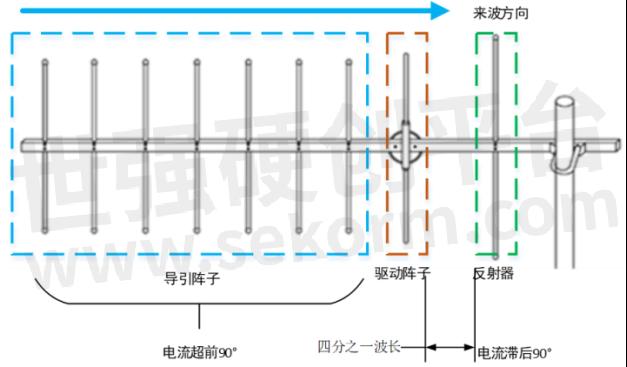
Operating principle of Yagi antenna
Wi-Fi Antenna Design
Antenna Structure
In this section, we will reconstruct the Wi-Fi antenna in HFSS to simulate its performance accurately.
The dimensions of the Russian viral Wi-Fi antenna, as shown in the diagram, consist primarily of seven discs and a metallic rod.
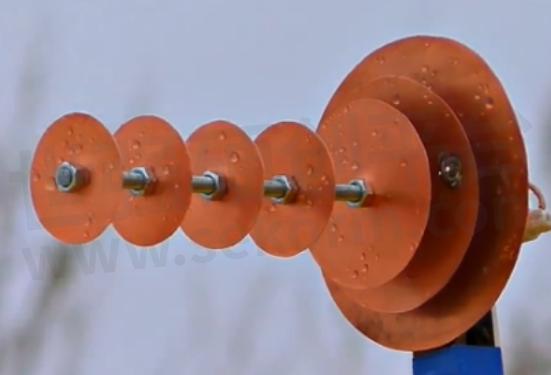
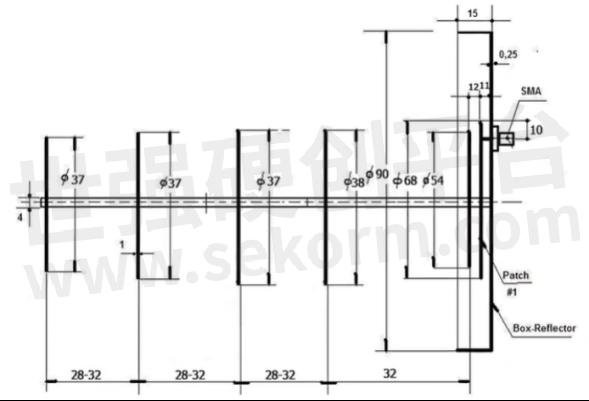
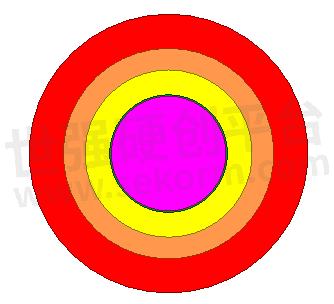
Antenna structure
The sizes of the seven discs are as follows, arranged from smallest to largest:
Disc 1: Diameter 37mm
Disc 2: Diameter 37mm
Disc 3: Diameter 37mm
Disc 4: Diameter 38mm
Disc 5: Diameter 54mm
Disc 6: Diameter 68mm
Disc 7: Diameter 90mm
The spacing between each disc is specified as follows:
Between Disc 1 and Disc 2: 28-32mm
Between Disc 2 and Disc 3: 28-32mm
Between Disc 3 and Disc 4: 28-32mm
Between Disc 4 and Disc 5: 32mm
Between Disc 5 and Disc 6: 12mm
Between Disc 6 and Disc 7: 12mm
Using these dimensions, we will construct the Wi-Fi antenna model in HFSS, as depicted in the diagram below.
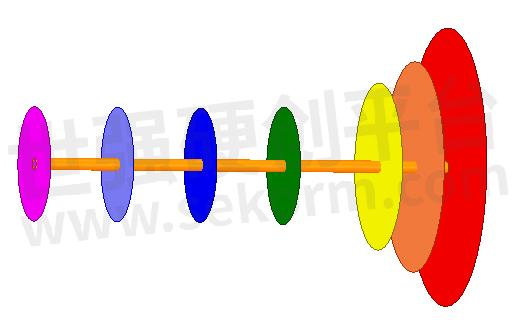
Wi-Fi antenna model
Principle of Operation
The seven discs of this Wi-Fi antenna can be categorized into three zones based on their functions: directors, driven element, and reflector.
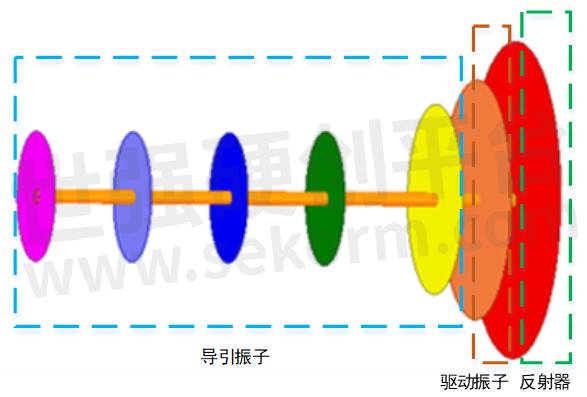
Operation is similar to that of a Yagi antenna: the directors of the antenna exhibit capacitive reactance to induce signals, with current leading voltage by 90 degrees. Electromagnetic waves induced by the directors radiate towards the driven element. Radiated signals travel a quarter wavelength to phase-shift by 90 degrees, precisely canceling out the initial leading phase, resulting in coherent addition of signals.
Analysis Results
After setting up the model and parameters for simulation, the results indicate strong directionality, as depicted in the graph.
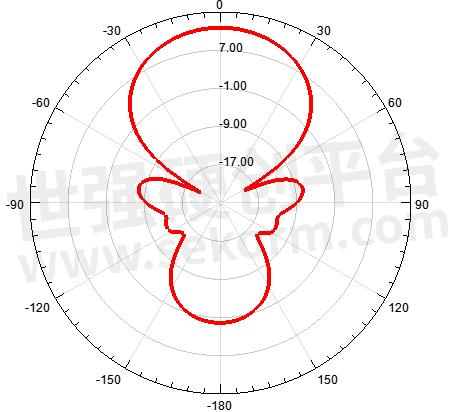
Directivity pattern
The VSWR of this antenna is shown in the graph below. It is evident that the biggest difference compared to a Yagi antenna is that this Wi-Fi antenna does not require a complex impedance matching mechanism to achieve a 50-ohm feed, providing great convenience for antenna enthusiasts in DIY construction.
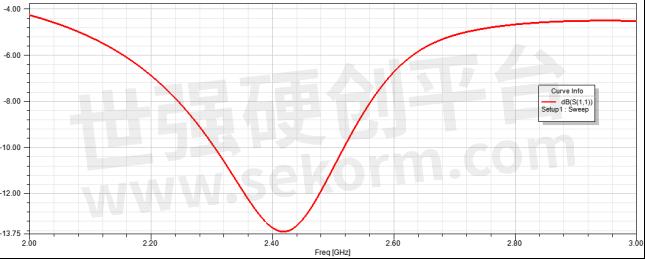
VSWR
Finally, the radiation pattern of this Wi-Fi antenna is depicted, with maximum radiation directed towards the director discs, exhibiting a gain greater than 10 dBi. This explains why it can receive signals beyond 3 km.
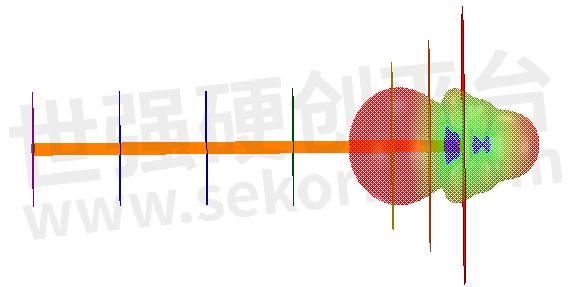
Radiation pattern of the Wi-Fi antenna
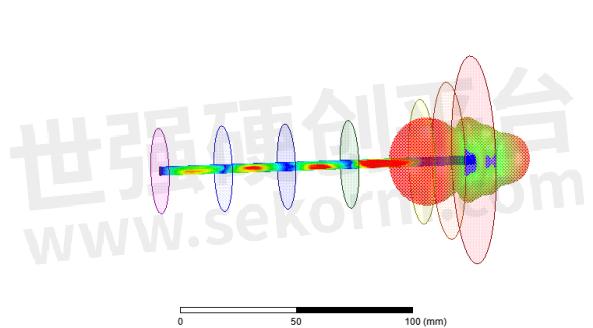
Voltage dynamic graph
Disclaimer: This article is excerpted from Microwave RF Network. Please contact us for removal if there is any infringement.
- |
- +1 赞 0
- 收藏
- 评论 0
本文由莫子若转载自Kinghelm Official Website,原文标题为:Interpreting the operating principles and design methods of the popular Wi-Fi antenna,本站所有转载文章系出于传递更多信息之目的,且明确注明来源,不希望被转载的媒体或个人可与我们联系,我们将立即进行删除处理。
相关推荐
金航标带你理解HDMI接口及如何挑选合适的HDMI线缆
对于那些在弱电领域或者日常电气使用中经常遇到各种接口问题的朋友来说,HDMI接口常常是一个棘手的难题。在本文的分享中,金航标带你将一起深入了解HDMI接口及其相关知识。
技术探讨 发布时间 : 2024-05-01
Introduction to Several Common Antennas for Wireless Communications
Antennas are crucial for wireless modules. Suitable antennas can optimize the communication network and increase the range and reliability of communication. The selection of antennas has a great impact on the data communication of final module. The article introduces several antennas from G-NiceRF Company.
技术探讨 发布时间 : 2024-07-01
Kinghelm‘s Internal Antenna KH857 with High Gain Capabilities and Wide Directional Map Beam
Unlock the power of seamless satellite signal reception and transmission with the Kinghelm Internal Antenna, KH857. This advanced antenna unit is engineered to excel in capturing BeiDou S frequency satellite signals while transmitting BeiDou L band signals with precision and reliability.
产品 发布时间 : 2024-05-29
Boost Your Network Performance with Kinghelm KH-SMA(J)-2.4G-RG174-L1M 4G Antenna
With its efficient and stable performance, wide compatibility, compact and lightweight design, and convenient installation, the Kinghelm KH-SMA(J)-2.4G-RG174-L1M has become a leader in the field of wireless communication.
产品 发布时间 : 2024-06-15
A Comprehensive Guide of How to Choose Antennas for Routers
In today‘s digital age, a reliable internet connection is crucial for both personal and professional activities. One of the key components that can significantly enhance your Wi-Fi signal strength and coverage is the router‘s antenna. Choosing the right antennas for your router can make a world of difference in your internet experience. This article will guide you through the factors to consider when selecting antennas for your router, including a focus on Kinghelm antennas, ensuring optimal performance for your home or office network.
设计经验 发布时间 : 2024-11-07
The Kinghelm KH3216-G8: A Leader in Wireless Communication Antennas with Compact Size and High Performance Characteristics
The Kinghelm KH3216-G8 is a multi-layer ceramic antenna specifically designed for various wireless communication applications including WLAN, Wi-Fi, Bluetooth, PHS, multi-band mobile phone antennas, and FM. The antenna employs advanced SMD chip design, achieving a perfect combination of compact size and high performance.
产品 发布时间 : 2024-06-20
Kinghelm Antennas: Leading the Way with 5.8GHz Technology
Kinghelm Antennas: Leading the Way with 5.8GHz TechnologyKinghelm has made significant advancements in antenna Kinghelm has made significant advancements in antenna technology, achieving a maximum frequency capability of 5.8GHz. This frequency band is crucial in wireless communications due to its advantages, including high transmission speeds, large bandwidth, and minimal interference. As a result, 5.8GHz is widely utilized in various sectors such as Wi-Fi, vehicle communication, and the Internet of Things (IoT).
原厂动态 发布时间 : 2024-10-29
Signal Mastery: Unleashing the Kinghelm KH859 Built-in Antenna
The KH859 Built-in Antenna is specifically designed for receiving BeiDou-frequency signals and transmitting BeiDou L-band signals, this antenna unit sets a new standard in performance and durability. The KH859 boasts high gain and a wide directional beam, crafted from ceramic process antenna materials, it is built to withstand extreme temperatures, impacts, and corrosion.
产品 发布时间 : 2024-05-28
Enhance Your 4G Experience with the Kinghelm YL46-4G-SMA-174-3M Antenna
The Kinghelm YL46-4G-SMA-174-3M antenna is an invaluable asset for 4G communication. Its exceptional performance, ease of installation, and versatility make it the ideal choice for fulfilling various communication needs in our daily lives.
产品 发布时间 : 2024-04-11
金航标RJ45连接器选型表
金航标提供RJ45连接器选型:额定电压(V):125 VAC RMS,额定电流:1.5A,LED:不带LED/带LED,类别:RJ插座,规格:弯插/直插/全包全塑等。
|
产品型号
|
品类
|
种类
|
使用寿命
|
颜色
|
额定电压
|
接触电阻
|
规格
|
LED
|
额定电流
|
|
KH-RJ45-56-8P8C-D-T
|
RJ45网络连接器
|
RJ45网络连接
|
至少750次循环
|
黑色
|
125 VAC RMS
|
最大35mΩ
|
带弹
|
带LED
|
1.5A
|
选型表 - 金航标 立即选型
金航标轻触开关选型表
金航标提供轻触开关选型,额定电流(mA):50mA,额定电压(V)12V,开关长度(mm):2-12mm,开关宽度(mm):1.8-12mm,开关高度(mm):0.35-24mm,机械寿命(次):5万次-30万次,以及多种安装方式:卧贴、立贴、直插、卧插。
|
产品型号
|
品类
|
额定电流(mA)
|
额定电压(V)
|
安装方式
|
开关长度(mm)
|
开关宽度(mm)
|
开关高度(mm)
|
按钮形状
|
引脚样式
|
按钮/盖帽颜色
|
机械寿命(次)
|
带支架
|
|
KH-2435-CAJ
|
轻触开关
|
50
|
12
|
卧贴
|
4.6
|
1.8
|
3.5
|
矩形按钮
|
SMD接片
|
黑色
|
8万次
|
否
|
选型表 - 金航标 立即选型
金航标TF卡座连接器KH-TF002,兼容性强、数据传输高效,打造高效稳定的存储连接新体验
KH-TF002作为Kinghelm金航标的一款TF卡座连接器,凭借其兼容性强、结构稳定、数据传输高效和耐用性高等特点,在电子设备中得到了广泛应用。无论是手机、平板电脑还是数码相机等便携式设备,Kinghelm金航标KH-TF002都能提供稳定可靠的TF卡连接解决方案。
产品 发布时间 : 2024-11-09
金航标排针选型表
金航标提供排针选型:PIN数:2-40PIN,间距(mm):0.8-2.54mm,类别:单排/双排/三排,额定电流(A):1-3A,多种安装方式:直插/立贴/弯插/卧贴/贴片。
|
产品型号
|
品类
|
间距(mm)
|
排针数
|
安装方式
|
额定电流(A)
|
PIN
|
度数
|
塑胶高度(mm)
|
PA(mm)
|
PB(mm)
|
PC(mm)
|
类别
|
|
KH-2.54PH180-3X40P-L11.5
|
排针
|
2.54mm
|
三排
|
直插
|
3A
|
3x40P
|
180度
|
2.5
|
6.0
|
2.5
|
3
|
常规
|
选型表 - 金航标 立即选型
金航标电池底座选型表
金航标电池底座选型:模具:1号模/6号模/7号模,耐电压(V):500-1000V,接触电阻(mΩ):30mΩ MAX,绝缘电阻(MΩ):1000MΩ MIN。
|
产品型号
|
品类
|
模具
|
材质
|
材料规格
|
耐电压(V)
|
触点
|
接触电阻(mΩ)
|
绝缘电阻(MΩ)
|
|
KH-CR2032-2-1
|
电池底座
|
1号模
|
铜
|
外壳:PBT黑色;RoHS
|
500V交流电源
|
触点:C2680黄铜;表面处理:镀锡
|
30mΩ MAX
|
1000MΩ MIN
|
选型表 - 金航标 立即选型
电子商城
服务
Ignion可支持多协议、宽频段的物联网天线方案设计,协议:Wi-Fi、Bluetooth、UWB、Lora、Zigbee、2G、3G、4G、5G、CBRS、GNSS、GSM、LTE-M、NB-IoT等,频段范围:400MHz~10600MHz。
最小起订量: 2500 提交需求>
可定制天线工作频段400MHz~77GHz,工作温度-40~+85℃、连接头/电缆类型等性能参数;支持GPS天线、组合天线、低频天线、定位精密测量天线、WIFI天线、5G天线、4G天线等产品定制。
提交需求>


































































































































































































登录 | 立即注册
提交评论